
The United Nations Environment Program (UNEP) Foresight Process report, titled "21 Issues for the 21st Century," suggests global regulations of food and water to deal with impending shortages and threats. (UNEP)
An environmental report issued by an agency of the United Nations last month has some critics sounding the alarm, saying it is a clarion call for "global governance" over how the Earth is managed.
The report, “21 Issues for the 21st Century,” from the United Nations Environment Program (UNEP) Foresight Process, is the culmination of a two-year deliberative process involving 22 core scientists. It is expected to receive considerable attention in the run-up to the Rio+20 United Nations Conference on Sustainable Development, which will be held in Rio, Brazil, in June.
The scientists who wrote the report say it focuses on identifying emerging issues in the global environment, and that it is not about mandating solutions.
But its critics see an agenda lurking in its 60 pages, which call for a complete overhaul of how the world's food and water are created and distributed -- something the report says is “urgently needed” for the human race to keep feeding and hydrating itself safely.
“This is more utopianism, pie-in-the-sky pleading for ‘global governance,’ including what they acknowledge as ‘novel governance arrangements,’ including, ‘alliances between environmentalist and other civil society groups,’” charged Chris Horner, author of Red Hot Lies: How Global Warming Alarmists Use Threats, Fraud and Deception to Keep You Misinformed, and a senior fellow for energy and environment at the free-market Competitive Enterprise Institute (CEI) in Washington, D.C.
[pullquote]
The Foresight Report suggests actions to save humanity from starvation, the overheating planet and the collapse of the world’s oceans -- options that include new “constitutional frameworks,” “international protocols” and a “shared vision” for land and water management that essentially rewire existing treaties and governments.
But the group insists it’s not a call for global governance.
“We are not talking about a world government,” said Dr. Oren Young, professor of institutional and international governance and environmental institutions at the University of California at Santa Barbara, and one of the scientists who issued the report.
He said the panel’s conversations included questions like, “How do we resolve these problems without creating this monster entity?”
Young said the panel wasn’t tasked with finding all the answers.
“We realize that government can be part of the problem,” he told FoxNews.com. “But we can’t close our eyes and say, ‘oh well, everything will work out,’ without us even looking at it.”
Even environmentalists don’t believe that planet-wide accords are particularly popular.
“I don’t think there is a global appetite right now for new institutions … or a world environmental organization like we have, say, with the World Trade Organization,” said Janet Redman, co-director of the Sustainable Energy and Economy Network at the progressive Institute for Policy Studies in Washington, D.C.
“There are a lot of places -- especially the oceans and food security -- where everyone is saying that doing this piecemeal is not going to address the bigger sense of these environmental issues.”
But on the whole, she said, global government probably won’t work.
“I think everyone agrees this is not the right time,” Redman told FoxNews.com.
The State Dept. has already weighed in on many of the issues presented by the Foresight Panel in its own statement, titled “Sustainable Development for the Next Twenty Years United States Views on RIO+20.”
Submitted to the U.N by the Bureau of Oceans and International Environmental and Scientific Affairs (OIES) in November, this policy vision makes it clear the State Dept. will back global government solutions -- whether they be in addressing the overfishing of the oceans, making national laws and regulations more transparent, addressing land and ocean-based pollution, or water management.
The U.S. also is wholly supportive of strengthening the UNEP as “a body through which governments can cooperate to recommend environmental policies, promote best practices, and build national capacity for governance, monitoring and assessment,” according to the vision statement.
Yet UNEP is unsuited for that, by the agency’s own admission.
An internal U.N study obtained by Fox News last June found that the $450 million organization is an administrative mess, not knowing how its money is spent or how many public and private partners it might be working with at any given time.
Questions about the ability of nations to work with global bodies such as the U.N, and whether they should subscribe to transnational guidelines or mandates, will no doubt be a subject of concern in the run-up to the Rio summit.
Just as global governance solutions are raised in the report, so are local solutions that involve local governments, private industry and promoting individual and community shifts in the way people live and tend to the environment in their daily lives and workplaces.








































